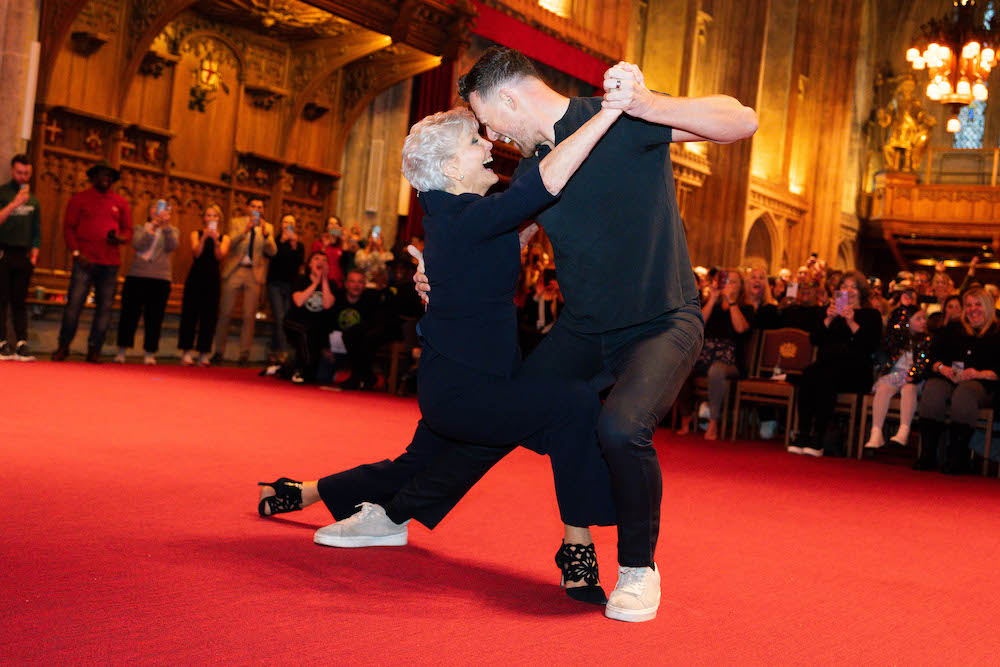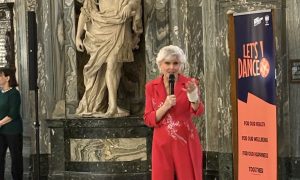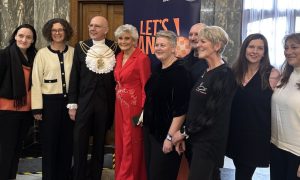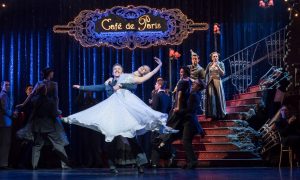Here, Dance Informa invites Angela Rippon to share her update on the Let’s Dance campaign.
The coming few months are going to be a really busy time for Let’s Dance. We have confirmed that next year’s National Day of Dance will be on Sunday, March 8, 2026. That’s when, once again, dance school and companies will be opening their doors to non-dancers in the general public and inviting them in to experience the brilliant benefits of dance for fitness and general health.
Our first Let’s Dance day, held earlier this year, has been evaluated by Professor Angela Pickard, the professor of dance at Canterbury University, working in partnership with the Sport and Recreation Alliance, and shown to have been a huge success.
Already, teachers and organisations have been getting in touch, confirming their involvement again next year. From Scottish Ballet based in Edinburgh, to the Eden Project in Cornwall, and teachers in Northern Ireland and Wales. Everyone is really keen to build on the success of our first National Day of Dance to get the nation dancing, and fit and making it even bigger and more successful.
On September 29, I chaired a discussion at the annual Labour Party conference in Liverpool, on the important role that sport and the arts have to play in improving and maintaining the nation’s health. My panel included a Government minister, a serving MP who is also a doctor, a representative from the world of professional football, the South Bank Arts centre in London, and a community-based arts hub on Merseyside in the North. As chair, I will lead the debate – but also speak specifically about the overwhelming benefit that dance can bring to the health and well-being of the mind as well as the body. As dancers and dance enthusiasts, you will all know this already. But we will have an audience that needs convincing!
It isn’t just a fun way to get fit and meet people. Dance has a valuable role to play in supporting relief and recovery in specific medical conditions, such as Parkinson’s, Stroke, cancer, obesity, and mental health. It’s something you can do regardless of age or physical condition. Going to the gym or joining a running club is not for everyone. Whereas dance is the perfect way to make an investment in your wellbeing pension plan – as you can build core strength, balance and flexibility well into your 80s even 90s. We will have an audience of some 400 delegates, many of them decision makers within government in general, health and social services in particular. The perfect audience to be converted of the value and important of the arts in health.
We are continuing to work with the National Health Service in the UK. One of the most exciting projects involves the possibility of getting dance teachers permanently engaged on the staff of large hospitals. At the moment, a number of hospitals in the UK welcome dance teachers into wards to entertain, and also encourage patients and staff, to dance, on an occasional basis. Outstanding examples, like the Chelsea and Westminster Hospital in London, have a dance studio built into the hospital, where outpatients regularly attend dance classes to help with recovery from operations, or stroke. In conjunction with the Ballet Rambert company, they even go into the ICU unit where appropriate. And in Scotland, Scottish Ballet have been working with staff and patients for over 10 years. Also, I have learnt of several hospitals in America where dance is welcomed alongside the work of physiotherapists and consultants.
But there is no national programme in Britain that includes all hospitals, where dance teachers are on permanent staff. So, it is really exciting to be discussing a possible pilot programme at a teaching hospital north of London, where a dance teacher will be on staff to work with patients in every area of the hospital and staff in conjunction with the staff physiotherapists. This is still in the very early stages of discussion. But if we can get it to work, it has huge potential to be rolled out nationwide to the benefit of staff and patients alike.
An important aspect of our campaign includes lobbying to get more dance into schools. Many children in Britain now have very limited access to any form of physical activity or stimulation through sport, music, drama or dance. The schools that do include dance in particular recognise the terrific impact this has on their pupils. There is generally less disruption in class, fewer exclusions, less absenteeism, and the students not only exhibit greater concentration and productivity in other academic subjects but also develop social skills that will be of enormous benefit to them in their future professional and family lives. We already have shining examples of this in schools like Herne Bay High in Kent, where dance is a vital part of the school’s curriculum. But would obviously like to see more schools following their lead. So we are thrilled to have made contact with the Royal Shakespeare Company (RSC) who have an outstanding programme of work, through which they introduce drama into schools, and have now joined with us to promote dance. Having the advice and support of such an internationally prestigious company like the RSC will certainly add weight to our campaign!














